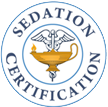Alaska Board of Nursing Review – May 2023
Reviewed by Sedation Certification – July 2025
State Sedation Policy – Yes
Can RN’s give sedation – Yes
Can LPN’s give sedation – No
Can RN’s give Propofol/Ketamine – Yes, with certain conditions
Contact the Board of Nursing if you have any questions!
Advisory Opinion on Nitrous Oxide
https://www.commerce.alaska.gov/web/Portals/5/pub/NUR_AO.RN.NitrousOxideMinimalSedationAdults.pdf – Click on link to read
Opinion on Ketamine infusions.
https://www.commerce.alaska.gov/web/portals/5/pub/nur_advisory_ketamine_administration.pdf – Click on link to read Advisory
OPINION: Registered Nurse Administration of Sedating and Anesthetic Agents
https://www.commerce.alaska.gov/web/portals/5/pub/nur1809.pdf – Link opens up information below in online PDF document.
Alaska Board of Nursing Advisory Opinion Registered Nurse Administration of Sedating and Anesthetic

1. RNs may not perform deep sedation.
2. The medication used to accomplish minimal or moderate sedation is left to the clinical judgment of the LIP. (Clarification added October 2015)
Scope Statement
The administration of pharmacological agents for sedation by a specifically trained Registered Nurse, other than a Certified Registered Nurse Anesthetist (CRNA), requires additional education and specific competency on the part of the Registered Nurse. One
level of sedation can quickly change to a deeper level of sedation due to the unique characteristics of the drugs used, as well as the physical status and drug sensitivities of the individual patient. The administration of sedating agents requires ongoing assessment and monitoring of the patient and the ability to respond immediately to deviations from the norm. Sedation should only be provided by a Registered Nurse who is competent in comprehensive patient assessment, is able to administer drugs through a variety of routes,
is able to identify responses that are a deviation from the norm, is able to intervene as necessary, and whose duties are solely the monitoring of that patient.
The Alaska Board of Nursing finds that it is within scope of practice for Registered Nurses to administer sedating agents in the acute care setting for minimal sedation (anxiolysis). Minimal sedation (anxiolysis) is a drug-induced state during which patients respond normally to verbal commands. Although cognitive function and coordination may be impaired, ventilatory and cardiovascular functions are unaffected. Anxiolytic agents include, but are not limited to, benzodiazepines and opioids. Anesthetic agents (such as propofol, etomidate, etc.) would not be appropriate for the purpose of anxiolysis.
The Alaska Board of Nursing finds that it is within the role and scope of practice for Registered Nurses to administer sedating and anesthetic agents to produce moderate procedural sedation for the non-intubated or intubated/ventilated patient, under the direction of a LIP, in the acute care setting, in accordance with the guidelines in this advisory opinion. In addition, there are other special circumstances under which administration of anesthetic or sedating agents are within the scope of practice of Registered Nurses, exclusively in the acute care setting. These circumstances are
explained within this Advisory Opinion.
Additionally, the Board states that the administration of sedating and anesthetic agents for the purposes of moderate procedural sedation expressed by this policy exceeds the scope of practice for the Licensed Practical Nurse (LPN) or unlicensed assistive personnel (UAP). These guidelines do not apply to Certified Registered Nurse Anesthetist (CRNA) or appropriately credentialed Advanced Nurse Practitioner (ANP).
If the patient receiving sedating/anesthetic agents progresses to the level of deep sedation or general anesthesia, the Registered Nurse’s responsibility and requirements outlined in this advisory opinion must be followed.
Nursing scope of practice relating to use of American Society of Anesthesiologists (ASA) Physical Classification:
Adult Patients
The Registered Nurse may administer moderate procedural sedation to an adult patient with an ASA score of I or II, if all the criteria detailed in this policy guidelines are met. The Registered Nurse may NOT administer to adult patients with an ASA score of III or IV unless a CRNA, or LIP credentialed by the facility in moderate procedural sedation, and competent in intubation and airway management is immediately available.
Pediatric Patients:
The Registered Nurse may administer moderate procedural sedation to pediatric patients (defined as an individual less than 18 years of age) in an acute care setting with an ASA score of I or II if all the criteria detailed in this policy guideline are met. The Registered Nurse may NOT administer to pediatric patients with an ASA score of III or IV unless a CRNA, appropriately credentialed Advanced Nurse Practitioner or LIP credentialed by the facility in moderate procedural sedation, and competent in intubation and airway
management is immediately available.
You will find the complete advisory opinion here https://www.commerce.alaska.gov/web/portals/5/pub/nur1809.pdf
